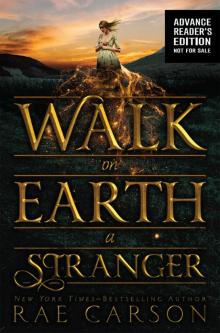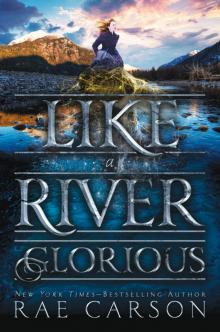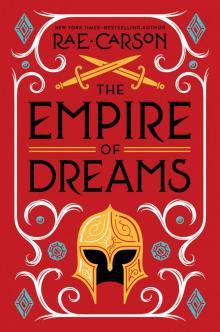- Home
- Rae Carson
Walk on Earth a Stranger Page 11
Walk on Earth a Stranger Read online
Page 11
“I heard he’s crewing with Fiddle Joe and Red Jack,” the clerk says.
“I don’t know any gentlemen graced by those sobriquets. But perhaps they have Christian names with which I would be more familiar?”
“Perhaps they do,” the clerk says. “But those are the only names I know. Great musicians both, fiddle and guitar.”
“Thank the good Lord you said guitar—I thought I might have to suffer a banjo.”
“Whatever you say. Is this everything?”
“Yes. Put it on my father’s tab and have your boys carry it down to the landing.”
“When do you need it?”
“At once. The river’s high, good for passage over the shoals.”
Free Jim warned me against taking a flatboat, but it might be my best option. If this Andrew Joyner fellow and his family are heading west, maybe I can follow. Or better yet, join up. It’d be a whole heap safer; those brothers would never have robbed me if I’d been traveling in a group, and it’s the last thing my uncle would expect.
I need to wrangle an introduction; it’s not proper to just go over and announce myself.
No, it wouldn’t be proper if I was a girl. Maybe I should walk right up and offer my hand. I take a few steps in his direction, but remembering his reaction to Abel Topper’s interruption gives me pause. If he considered Topper uncouth, then he certainly doesn’t have time for me, with my bad haircut, mud-smeared shirt, and ill-fitting trousers. I pretend to examine the hats on a nearby stand while I try to figure out what to do.
“Say hi to Captain Chisholm for me,” the clerk says.
“I certainly will,” Mr. Joyner says.
Captain Chisholm. That’s who I need to talk to. I dash from the store, looking right and left to make sure Topper is not around. Captain Chisholm, Captain Chisholm, I repeat silently.
The blacksmith is only a few blocks away. I walk fast, but not too fast, hat brim low, hands shoved into my pockets. I glance around one last time before heading into the stable, and I nearly trip over my own feet because Abel Topper is just down the street, broken suspender swinging at his side. I hold my breath as he mounts the steps to a tavern door and disappears inside.
Now is my chance. If Peony isn’t shod yet, we’re leaving, anyway.
“You’re in luck, lad,” says the blacksmith’s apprentice, coming toward me. “Just finished with your pretty mare.”
My relief is so great I nearly stumble. “So fast!”
He shrugs. “You’re paying for it.”
I fumble for my money and hand him two dollars. “Thank you.”
“Heading west like everyone else?” he says.
I almost deny it, but I get a better idea. “Sure thing. Heading to Kentucky on the Federal Road tomorrow.”
“Well, good luck.”
Peony nickers in greeting, and I drag her from the stables. I ask the first person I bump into: “Which way to the landing?”
“You’re close enough to smell it,” he snaps, and he walks off.
I sniff the air; he’s not wrong. Following the fishy, rotten vegetable scent of slow water, I head toward the riverbank and see it at once. I stare, mouth agape.
A line of flatboats hugs the river’s edge. They seem as rickety as rafts, but they’re eighty to a hundred feet long and covered with low roofs. One is full of cattle; others are stacked with barrels, which men are rolling down the riverbank. In the middle of the river, a small, rocky island serves as anchor for a swing ferry. A thick line of people stretches along the landing as they wait their turns to cross.
“Where can I find Captain Chisholm?” I ask one of the men rolling barrels.
He wipes sweat from his brow with the back of his glove and points me to a flatboat that sits high in the water on account of not having cargo.
I stare at the boat, hesitating. If Mama is watching, she’ll probably toss in her grave to see me walk over to a bunch of strange men and ask a favor. But I’m Lee McCauley now, I remind myself. It shouldn’t be a big deal.
I leave Peony tied to a dock post, then I hitch my suspenders the way I’ve seen Jefferson do a hundred times and swagger across to the boat like I’ve every right. “Captain!” I stand at the dock’s edge and holler down under the roof. “Hey, Captain.”
A short fellow with a sunburned nose and carroty hair pokes his face out. “Who’s asking?” he says.
“I am.”
“Who’re you?”
“Who’re you?”
He grins. “Red Jack.”
“Are you going to California, Red Jack?”
He steps into the cold sunshine. His feet are bare, and his belly hangs over the waist of his trousers. His suspenders strain to keep them up.
“Lord, no, we’re just heading over to the Mississippi.”
“But you’re taking folks west, right?”
“Are you a friend of Mr. Joyner’s?”
“Never met him. Just heard you were taking people west, and I’m looking for a ride in that direction.”
Red Jack studies me, running a hand through his hair like he’s trying to stir loose some thoughts. “We’re taking Mr. Joyner’s family as far as Missouri. They’ll have to walk the rest of the way on their own.”
“How much for passage to Missouri?”
“Rates are up to the captain, who ain’t here right now.” He looks me up and down, taking in my filthy clothes, my second- or thirdhand hat. “But if you ain’t with the Joyners, you ought to know they’ve hired the whole boat for themselves.”
My shoulders slump. “All right,” I say, gazing down the length of the river at all the other flatboats. It’ll mean talking to an awful lot of people, but surely I can find someone willing to take us aboard.
“Ah, don’t go looking all forlorn,” he says.
Another fellow pokes his head out. He’s so tall he can’t stand up straight until he’s out of the cabin. His skin is as wrinkled and brown as tree bark, and his twiglike fingers are long and thin. He sees me and smiles, and it’s such a friendly, craggy grin that I can’t help grinning back.
“Are you the captain?” I ask.
“No, name’s Joe.”
Fiddle Joe. He turns away and starts up a fire in the little cookstove perched on the edge of the boat. His back is still turned when Joe says, “You like chicory coffee?”
A cup of warm anything would taste heavenly at the moment. “Yes, sir.”
“Then come aboard.”
I glance toward Peony to make sure she’ll stay in view, and I step onto the deck, which looked solid enough from shore but is actually in a constant state of sway. As my legs adjust, Joe hands me a tin cup steaming with coffee. It’s hot enough to scald my tongue, but no bitter liquid has ever tasted so sweet.
Red Jack returns carrying three small chairs and a table, which they set up on the open deck. “Well, don’t stand there like a begging dog, sit down for supper,” Red Jack says.
I can’t believe my luck. I pull up a seat, and Joe slaps down three bowls of grits mixed with runny eggs. The other two start eating, but I hesitate to dig in.
“Don’t be shy, boy,” Joe says to me. “Eggs and grits make as fine a supper as they do a breakfast.”
It’s the “boy” that does it. I shovel the mess into my mouth like a starving stray. Joe sure likes his salt, more than Mama ever put on our food, but I don’t mind one bit. “Thank you,” I say around a huge mouthful.
“So, you’re an argonaut, eh?” Red asks. “Heading to California with the rest?”
I swallow and say, “I’ve got a friend—well, practically family—who’s going west, and I said I’d meet up with him in Independence, like we read about in the paper.”
Joe nods knowingly. “Lots of folks meeting up there. But Mr. Joyner is the only one who can decide on passengers.”
I frown. Guess I’ll have to work up the courage to introduce myself to that fine and proper man after all. Might be worth it to spend the money for a shoeshine first. Maybe even a barber to fix my sawed-off hair. If I can work up the courage to go to a barber.
No, doing anything in town puts me and Peony at risk of being discovered.
“But he doesn’t have any say over the crew,” says a voice behind me.
I look over my shoulder. He’s the roughest of the bunch so far, with a square jaw, uneven stubble that make him look like he shaves with a spoon, and red-rimmed eyes from either exhaustion or drink. Joe slaps another bowl of grits down on the table and gives up his chair for the newcomer.
“I don’t know anything about crewing boats,” I say, eyeing him warily. He looks too much like the brothers who robbed me, with his unkempt hair and ratty shirt. “To be completely honest, this is the first time I ever set foot on one.”
The newcomer swallows his coffee. “If you want to hire a flatboat to carry you over to the Mississippi, I can recommend some to you.”
“I just want to get there, whatever way I can. I’ve been walking overland so far.” But I don’t want to keep on that way, and the sullen tone of my voice gives me away.
Red says, “It’s much nicer on the river. And faster. The current does all the work.”
Faster. I desperately need faster.
“Not all the work,” the rough man says. “I have to do a bit of it too, while the two of you are busy plucking strings and scaring off the fish.”
“Singing lullabies, making ’em easier to catch, you mean,” Red says.
“We could use another hand,” the rough one says. “Someone to do the unskilled labor on board.”
“For God’s sake, just don’t tell him you sing,” Red Jack mutters.
“I don’t sing at all, sir,” I hurry to say. I love singing, truth be told, but my singing voice would give me away as a girl faster than you could say Open your hymnals.
“That’s too bad,” the newcomer says. “So, if we give you victuals and transport—”
“For me and my horse?”
“For you and your horse, you do whatever work we need on the way.”
I don’t know what unskilled labor is, and I don’t care. There’s no way my uncle or Abel Topper or those brothers could follow me on a boat. And even though I can’t walk on water like the Lord, as Free Jim suggested, Peony and I can swim just fine. “That’s a wonderful idea, sir. I’ll ask the captain.”
Red and Joe share a chuckle. Joe picks up the empty plate and mug. “This is the captain,” he says to me in a low voice.
My face warms.
“Rodney Chisholm,” the captain says.
“Lee,” I reply. “Lee McCauley.”
“Pleased to meet you and welcome aboard, Mr. McCauley.” He stands up. “This is just a trial, boy. A week from now, if you haven’t proved trustworthy and able, we’ll put you ashore.”
“Understood, sir.”
“This table and chairs get stacked in that nook.”
Seconds pass before I catch on. I jump up. “Yes, sir!”
I try to tuck all three chairs under one arm, but they slip from my grip and clatter to the deck. So I pick up two and run to put them away, then come back for the last.
The crew stands at the bow, smoking their pipes, watching me.
“Please tell me I was never that green,” Joe says.
“Ha,” the captain says. “Don’t let Joe fool you, boy. I signed him on to do unskilled labor too.”
“Thirty-four years old before I ever set foot on a flatboat,” Joe says. “If an old dog like me can learn it, you’ll do fine.”
My face feels hot under their scrutiny as I stack the last chair. Beneath the roof, the boat is divided into stalls. Some are filled with straw; others are fitted with cots or hammocks. It feels like a barn—a barn on water!—which makes it feel a little like home. I guess it is home for some. I bet the crew spends the whole year on this boat.
These fellows don’t know anything about me, and yet they’ve taken me into their home. I know I’ll be working for my keep, but it still feels like an act of angels when I sorely need one. It’s a second kindness in almost as many days. Not everyone is like the brothers or Uncle Hiram. I’d do well to remember.
UNCORRECTED E-PROOF—NOT FOR SALE
HarperCollins Publishers
..................................................................
Chapter Thirteen
The flatboat is long and low and dark. It takes a bit of tugging to convince Peony to come aboard. She prances in place in response to the boat’s gentle sway, but she settles upon seeing her stall. It’s dry and has fresh straw and plenty of feed, which seems to be all that matters.
Once she’s out of sight and happily eating, it seems as though a weight drops from my shoulders, and I can breathe easy for the first time in days.
A slave boy from the general store brings the supplies down about an hour later. I help him unload the cart and carry everything into the empty stalls. I can’t figure what some of the items have to do with gold prospecting—like the two full bottles of laudanum or the Oldridge’s Balm of Columbia for hair and whiskers—but it’s possible Mr. Joyner knows something that I don’t.
The surface of the river is burnished red gold with late-afternoon sunshine when two men roll a huge wagon down to the dock. I stare agape at it, wondering how in the world we’ll get everything aboard. It’s full to bursting with flour, grains, barrels of salted pork, and a whole heap of fancy furniture. There’s a sideboard table, and four high-back chairs. A bed frame and a feather mattress. A lady’s dresser with a gilded mirror. Mr. Joyner said he was moving his whole household, but I didn’t figure that meant his whole house.
We unload it all, every single piece, and it’s a good thing Mama’s shawl is wrapped so tight around my chest because sweat pours down the front of my shirt, making it stick to any available skin.
By the time we finish, it feels like my aching back won’t bear another burden, which is when the captain directs us to disassemble the wagon. I don’t dare complain or show even a hint of weakness, so I go at it like I’m as fresh as the morning.
After taking the wagon apart, we heft and slide the wagon box onto the boat. Then we fill the box with all the other pieces—the wheels, the tongue, the bonnet. Next, we bring the oxen aboard. There are four teams of two, which seems like a lot for one wagon, but when you’re moving a whole household, I guess that’s how many you need. The huge beasts don’t care for their stalls, and they have a lot to say on the matter, but once they’re settled in and we spread some straw, they seem resigned.
“Where’s the rest of it?” Captain Chisholm asks once the wagon and oxen are all safely aboard.
“There’s more?” I gasp.
“You have a problem, son?”
“’Course not.”
He grins.
Suddenly my plan to go all the way to California with nothing but Peony and a saddlebag seems like the height of tomfoolery.
By evening, more supplies and more animals have arrived, including a pair of fine horses and a hound dog with white patches and drooping ears, who licks my hands and face as if we’re long-lost friends. I scratch his ears and rub his scruff, thinking about Nugget. I hope she’s a comfort to Jefferson on the road, the same way Peony is a comfort to me.
“Coney, get over here before I whip your hide.”
It’s Mr. Joyner, dressed in a fine black suit with a yellow silk cravat. Standing prim beside him is a pretty blonde woman in a blue calico dress and a lace shawl. One hand clutches an embroidered satchel, full to bursting; the other grips the shoulder of a girl in blonde braids who can’t be more than six years old. Another child, a tow-headed boy of about four, stands half hidden in her voluminous skirt, though he dares to peek out
at me. I wink at him, and he turns away fast, burying his face in his mama’s skirt.
Even the two children carry bulging satchels. At the family’s feet is a huge luggage trunk, which will probably take all four of us to haul inside and which Coney the dog is now giving a thorough sniffing.
Red Jack shares an amused look with me before grabbing a couple of satchels. “That’s a fine rocking chair we just loaded,” he says by way of conversation.
Mr. Joyner nods solemnly. “I’m having my whole house disassembled and floated downriver on another flatboat,” he explains as we work. “When it reaches New Orleans, it’ll be loaded onto a ship and sent down to Panama, where it will be trucked across the isthmus and then loaded onto another ship and transported up the coast to California. We’ll have our own familiar home waiting for us—walls and all—when we get to San Francisco. We’re only bringing with us those things essential to our overland journey.”
I had no idea packing up a whole house was possible—or that a dressing table could be considered essential. “Why didn’t you go the same way?” I ask.
He seems startled that I would dare speak to him, but he answers nonetheless. “And expose my wife and children to the harsh climates and rough heathen of Panama? Or the relentless waves of the Pacific? Never. Besides, the trip across the continent will be an adventure, something they’ll remember for the rest of their lives. Isn’t that right, Andy?” He tousles the boy’s near-white hair.
“Yes, Pa,” Andy says, but he gazes wide-eyed at the decking before him. The river is choppy with activity, which makes the boat pitch and sway. He slips a hand into his mother’s.
Mrs. Joyner is stiff beside her husband, and I’m put in mind of an egret, the way the woman’s senses are attuned to everything around her, the way she stands so pale and frozen, but perhaps ready to launch into graceful flight if startled. She squeezes her son’s tiny hand, saying, “It’s God’s will for America to cover the continent from sea to sea.” Her voice is soft, and it seems to have a question in it. “We’ll be part of something grand, helping spread civilization into the wilderness.”

 The Crown of Embers
The Crown of Embers The Girl of Fire and Thorns
The Girl of Fire and Thorns Walk on Earth a Stranger
Walk on Earth a Stranger Into the Bright Unknown
Into the Bright Unknown The Bitter Kingdom
The Bitter Kingdom The Rise of Skywalker
The Rise of Skywalker Like a River Glorious
Like a River Glorious The King's Guard
The King's Guard The Empire of Dreams
The Empire of Dreams Most Wanted
Most Wanted The Crown of Embers fat-2
The Crown of Embers fat-2 The King's Guard (fire and thorns)
The King's Guard (fire and thorns) The Girl of Fire and Thorns fat-1
The Girl of Fire and Thorns fat-1 Fire and Thorns 00.7: King's Guard
Fire and Thorns 00.7: King's Guard The Shadow Cats (fire and thorns )
The Shadow Cats (fire and thorns ) The Shattered Mountain (fire and thorns)
The Shattered Mountain (fire and thorns)